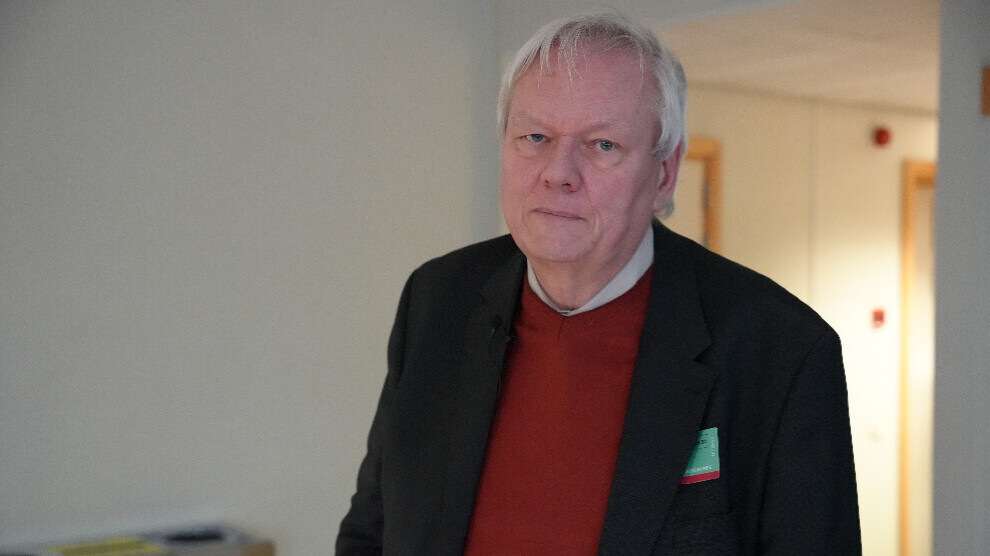Lawyer Fermon: Turkish State’s top officials responsible for war crimes in Rojava
Lawyer Jan Fermon said that the Turkish state has committed three types of international crimes and added that responsibility lies at the highest levels of the state.
Lawyer Jan Fermon said that the Turkish state has committed three types of international crimes and added that responsibility lies at the highest levels of the state.

The Turkish state and its proxies continue their occupation attacks on Northern and Eastern Syria, specifically targeting civilians and residential areas. Cities such as Afrin (Efrîn), Girê Spî, and Serêkaniyê have undergone systematic demographic change, forced displacement, looting, and severe human rights violations since their occupation.
From the beginning of the invasion, hundreds of civilians have been killed, and thousands have been displaced, becoming refugees. The Kurds, Arabs, Syriacs, and other communities living in the region endure intense repression, while the unlawful practices imposed by the occupying forces deepen with each passing day. Cases of abduction, rape, and executions against women are increasing, and historical and cultural heritage sites are being plundered. While the international community remains silent in the face of these crimes, the people of the region continue their resistance.
The Turkish state and the Syrian National Army (SNA) have targeted numerous areas under the Autonomous Administration, seeking full control of the region after the collapse of the Assad regime. These attacks have resulted in the deaths of dozens of civilians, including Kurdish journalists, while causing extensive damage to infrastructure and essential services. With these occupation assaults, the Turkish state seeks to destabilize the region, force people into displacement, and expand its occupation. However, the people of the region continue to resist these attacks, as seen in their steadfast defense of Tishrin Dam.
ANF spoke with lawyer Jan Fermon, a criminal law, humanitarian law, and international law expert from the Brussels Bar Association, to discuss the implications of the crimes committed by the Turkish state in Northern and Eastern Syria and the occupied territories under international law.
The Turkish state is committing systematic war crimes
Lawyer Fermon stated that the Turkish state has committed three types of international crimes in Northern and Eastern Syria. He outlined these crimes as follows: "The first is the crime of aggression. The Turkish state's attacks constitute a military operation against a sovereign country. Under these circumstances, no state has the right to use force against another. The crime of aggression enables all other crimes and serves as their foundation.
The second is crimes against humanity. These crimes are being committed on a large scale and in a systematic manner, fitting the definition of crimes against humanity. In particular, forced displacements are taking place to replace the Kurdish population with an Arab demographic.
Lastly, war crimes are being committed. However, these are not isolated incidents but rather systematic war crimes. There are war crime campaigns specifically designed and executed to force the population into displacement. Crimes such as rape in prisons and the bombing of civilians and civilian infrastructure all share the common objective of uprooting the population. Therefore, these crimes are interconnected."
Lawyer Fermon stated that the Turkish government and its officials are directly responsible for the war crimes and crimes against humanity committed in the region. He explained: "These crimes are not individual actions carried out by a single soldier. In fact, they are part of an organized and systematic series of offenses, and such crime campaigns can only originate from the chain of command. These attacks are not simple drone strikes carried out at the discretion of individual soldiers. A soldier cannot decide alone to launch a drone to strike a civilian target. These assaults are meticulously planned by the highest-ranking military officials. Therefore, the generals leading these attacks and the top political authorities granting the military the authority to act in this manner bear responsibility."
The sentence that the People's Tribunal will deliver will be crucial
Lawyer Fermon, who served as a prosecutor at the Rojava People's Tribunal organized by the Permanent Peoples' Tribunal (PPT) on 5-6 February in Brussels, underlined the significance of the final rulings of this court. He said: "The tribunal will reach a verdict, and I hope it will recognize that the evidence we presented indeed constitutes war crimes, crimes against humanity, and the crime of aggression. This ruling must become a tool to pressure our governments into taking action against Turkey. The most crucial aspect is that the decisions made by this tribunal will legitimize the struggle we are carrying out. The judges issuing these rulings are legal professionals who have dedicated their lives to the judicial system, giving these decisions undeniable weight. This is no longer just an opinion; it is a legal assessment confirming these crimes. These rulings will exert pressure on governments, compelling them to act."
The struggle will be decisive
Lawyer Fermon emphasized that the real force ensuring the protection of international law lies in the struggle of the people. Concluding his remarks, he stated: "The United Nations has a responsibility, but as I always say, the UN does not have its own police force. At the end of the day, international law is upheld through the struggle of the people. It is the people who will pressure governments to take action, impose sanctions, halt arms sales, and sever diplomatic ties. The mechanism that ensures respect for international law does not rely on the UN or a non-existent international police force, but rather on the will and actions of the people."